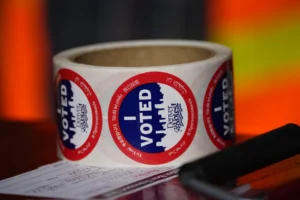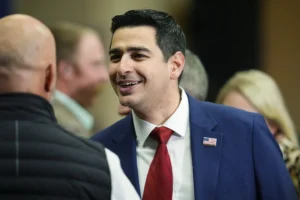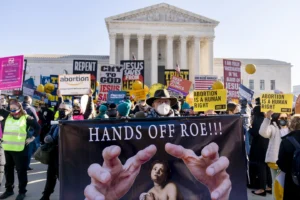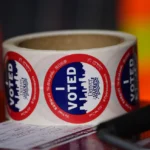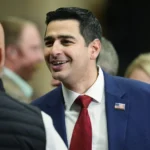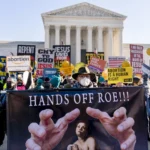Abortion Legal Again in Wyoming as Judge Halts Ban for Third Time
Authorities announce arrest of alleged Casper abortion clinic arsonist hours later
- Published In: Politics
- Last Updated: Mar 23, 2023
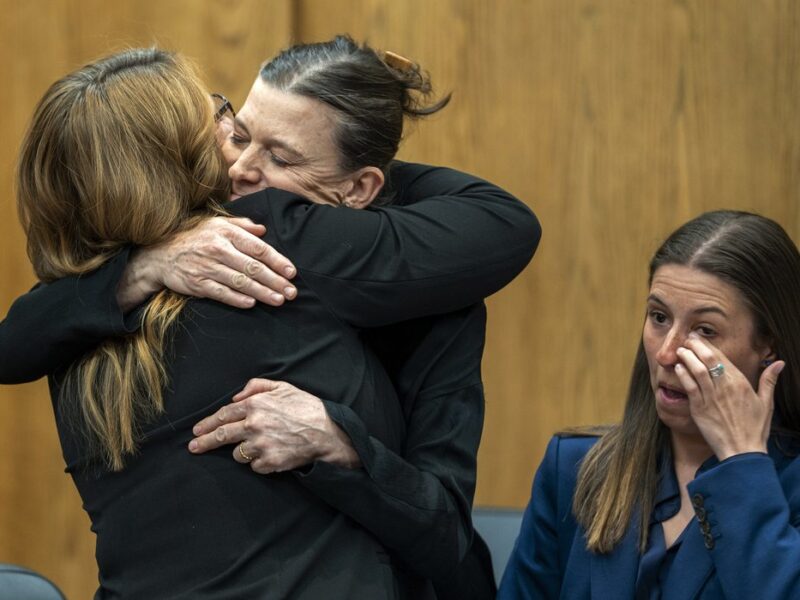
Dr. Giovannina Anthony, second from left, an OB/GYN and plaintiff in a lawsuit challenging Wyoming's new law banning most abortions, hugs her attorney after Ninth District Court Judge Melissa Owens issued a temporary halt of the law on Wednesday. (Kathryn Ziesig/Jackson Hole News & Guide via AP)
By Jacob Gardenswartz
Special to the Wyoming Truth
Hours after a Wyoming judge on Wednesday temporarily blocked the state’s newly-enacted total abortion ban from being enforced, federal authorities announced that a Casper woman had been arrested and charged with the May 2022 arson of a would-be abortion clinic.
Lorna Roxanne Green, 22, was arrested on Tuesday and charged with arson of a facility engaged in interstate commerce, according to the U.S. Attorney for the District of Wyoming Nicholas Vassallo. If convicted, Green faces a minimum of five years and up to 20 years in prison, as well as fines of up to $250,000.
The announcement of Green’s arrest came as Teton County District Judge Melissa Owens issued a temporary restraining order against House Bill 152, the “Life is a Human Right Act,” which banned most abortions in Wyoming. That measure, passed by the legislature earlier this year and enabled to become law by Gov. Mark Gordon last weekend, was an attempt by Rep. Rachel Rodriguez-Williams (R-Cody) and others to circumvent the legal challenges to last year’s near-total abortion ban, which had been previously blocked by Owens.
Even before HB152 was allowed to take effect, a coalition of Wyoming residents, doctors and abortion rights proponents — the same group who successfully argued to temporarily halt last year’s ban — filed a similar lawsuit seeking to strike down the new law. In an emergency hearing Wednesday afternoon, attorneys clashed over whether the state legislature was justified in its assertion in the new law that abortion is “not health care” — a claim central to their efforts to avoid legal scrutiny.
But in a ruling from the bench, Owens sided with the plaintiffs.

“The legislature declaring that abortion is not health care takes away from the duty of this court to decide constitutional questions of law,” Owens said. “It’s not clear if abortion is or isn’t health care, and the court has to then decide that in the future.”
Arguments center on health care, religious debates
Arguing in favor of blocking the abortion ban from being enforced, attorney John Robinson claimed passionately that it trampled on the rights of Wyoming women, going so far as to insinuate that state lawmakers “[do] not consider a woman an equal member of the human race” during pregnancy.
“They are merely vessels carrying fetuses, and their rights to equal protection, to health care, religion… are implicated by that choice by the Wyoming Legislature,” Robinson argued.
Robinson and fellow attorney Marci Bramlet laid out four key arguments as to why the abortion ban should be stricken.
First comes the question of whether abortion should be considered health care. Despite legislators attestations to the contrary, Robinson noted abortions in Wyoming can only be performed by licensed medical professionals and abortion medications only purchased with a prescription — clear evidence, he suggested, that the procedure amounted to a health care decision.
Robinson highlighted that the Wyoming Constitution guarantees adult residents the right to make their own health care decisions, something he said should extend to abortions.
Special Assistant Attorney General Jay Jerde, representing the state, argued that the provision in the state constitution was passed as a means of pushing back against Obamacare, not extending to citizens’ broad health care rights. He also pointed to a subsection of the so-called “health care freedom” amendment enabling the legislature to impose “reasonable and necessary” restrictions on health practices to protect the “health and general welfare” of the citizenry.
In her questioning, Owens asked whether Jerde, by making that argument, was himself conceding abortion was a form of health care. Jerde insisted he was not.
Robinson and Bramlet also highlighted attestations by the plaintiffs that the new law privileges certain religious beliefs over others. Kathleen Dow, a practicing Jew, said in the complaint that her religion does not believe life begins at conception and forces her to prioritize a mother’s life over that of the fetus she’s carrying.
On the religious argument, Jerde urged the judge to consider the legislative history of the law, arguing there was no religious intention behind it whatsoever. Given the vast number of religions, Jerede said, “from time to time, laws that are duly enacted are going to bump up against what some people believe under their religion, and you’ve got to show more than just a coincidental overlap.”
The plaintiffs’ attorneys also argued the new ban violated the equal protections clause, restricting women’s right to health care but not men’s, and was unconstitutionally vague in its exceptions.
“It is intended to be difficult to interpret so people are discouraged… from offering any type of service that might land them in the jail cell,” Robinson argued.
Owens concluded that many of those questions remained unanswered and would be considered in future hearings. In the meantime, she said the plaintiffs “have met their burden” to argue on behalf of a temporary restraining order and thus enjoined the law from taking effect indefinitely. She hinted that she may encourage attorneys on both sides to combine future arguments on behalf of a preliminary injunction with those that would be made in a full trial, in an effort to expedite a final decision.
Left unaddressed was whether Wyoming’s recently-passed chemical abortion ban — the first in the nation — would be allowed to stand. On Tuesday, plaintiffs added on a request to strike down that law to their lawsuit against HB152. Owens has not yet ruled on that law, which won’t take effect until July.
Abortion rights supporters celebrate, opponents lash out
Immediately after Owens rendered her decision, abortion rights supporters throughout Wyoming and the nation celebrated.
“We are relieved and delighted that abortion will remain legal in Wyoming,” Julie Burkhart, president of Wellspring Health Access, one of the plaintiffs in the case, said in a statement. “Regardless of how anti-choice legislators try to spin it, abortion is health care, and Wyomingites have a constitutional right to that care. Every day that abortion is legal in Wyoming is a victory for patients, families, and communities.”
“Organize. Everywhere,” wrote Sen. Tina Smith (D-Minn.) on Twitter, above a screenshot of a news story announcing the law had been blocked.
Wyoming abortion opponents, meanwhile, reacted with anger.
“Forum shopping and judicial activism have resulted in the issuance of a temporary
restraining order against the law,” the Wyoming Freedom Caucus said in a statement. The group attacked Owens as a “Gordon appointee” who “erroneously stated that the court ‘cannot legislate away a constitutional right.’”
Wyoming takes center stage in national abortion debate
The halting of the abortion ban and arrest of the alleged abortion clinic arsonist have thrust Wyoming to the forefront of the national conversation surrounding abortion rights.
After the state became the first in the nation to explicitly outlaw abortion medications, Vice President Kamala Harris and White House Press Secretary Karine Jean-Pierre weighed in, with the later calling the new law “yet another assault on safe and effective medication the FDA approved over 20 years ago.”
Last year’s arson of Wellspring Health Access, an abortion clinic under construction in Casper, also made national headlines, leading to a PR campaign to catch the assailant. Federal authorities credited the recent announcement that the reward for sharing information about the case would be raised to $15,000 — something only possible due to an “anonymous donor” — as key to making Tuesday’s arrest.
Green is set to appear before U.S. Magistrate Judge Kelly H. Rankin Thursday morning. It is unclear how Green intends to plea, but the government’s complaint against her says she confessed to committing the arson, stating she “did not like abortion and was having nightmares which she attributed to her anxiety about the abortion clinic, so she decided to burn the building.”

